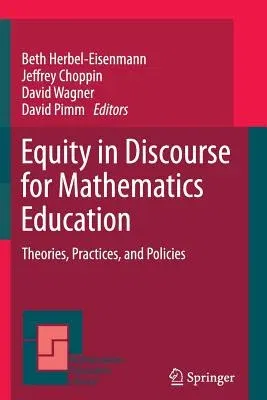Equity in Discourse for Mathematics Education: Theories, Practices, and Policies (2012)Paperback - 2012, 1 March 2014

Qty
1
Turbo
Ships in 2 - 3 days
In Stock
Free Delivery
Cash on Delivery
15 Days
Free Returns
Secure Checkout
Part of Series
Mathematics Education Library
Print Length
270 pages
Language
English
Publisher
Springer
Date Published
1 Mar 2014
ISBN-10
9400793650
ISBN-13
9789400793651
Description
Product Details
Book Edition:
2012
Book Format:
Paperback
Country of Origin:
NL
Date Published:
1 March 2014
Dimensions:
22.86 x
15.24 x
1.52 cm
ISBN-10:
9400793650
ISBN-13:
9789400793651
Language:
English
Location:
Dordrecht
Pages:
270
Publisher:
Weight:
453.59 gm

